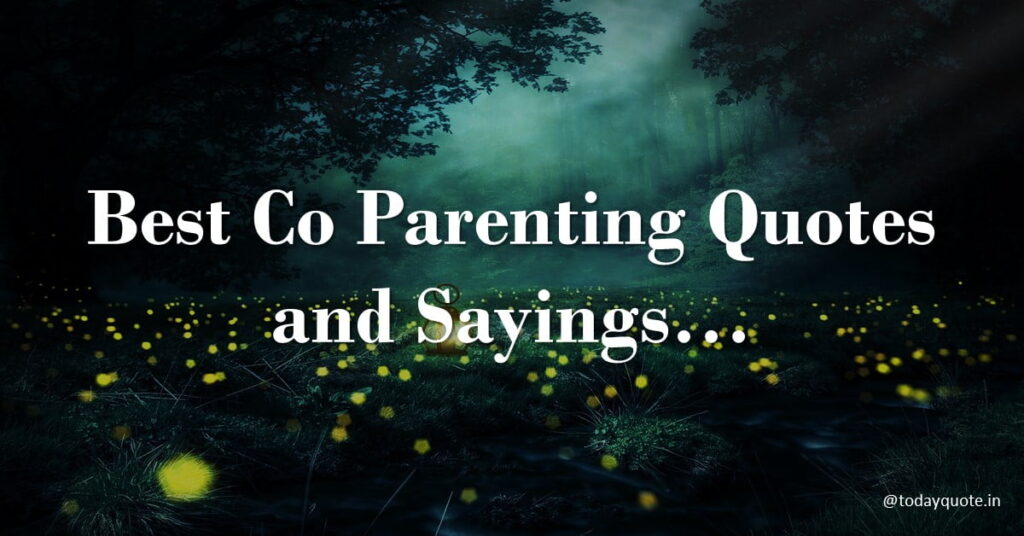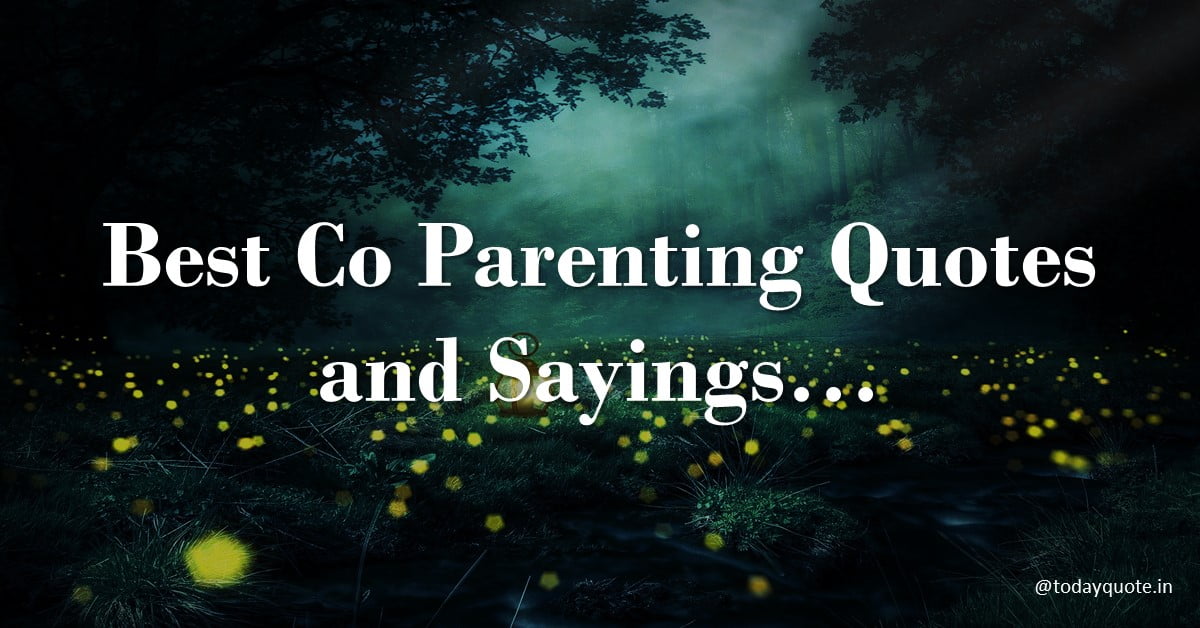
Decoding the Damage: Exploring Bad Co-Parenting Quotes and Their Impact
Co-parenting, the often-complex dance of raising children after separation or divorce, can be a challenging endeavor. While the goal is always the well-being of the child, the reality can sometimes fall short. This article delves into the detrimental impact of bad co-parenting quotes, examining how these phrases can undermine healthy communication, foster conflict, and ultimately, harm the child involved. We will explore the common types of destructive quotes, their psychological effects, and strategies for navigating the minefield of co-parenting with grace and resilience. The pervasive nature of these quotes underscores the need for awareness and proactive measures to protect children from the fallout of parental discord. Understanding these bad co-parenting quotes is the first step towards fostering a more constructive and child-centered approach.
The Toxic Terrain: Identifying Destructive Co-Parenting Quotes
The landscape of bad co-parenting quotes is vast and varied, often reflecting the underlying tensions, resentments, and unresolved issues between parents. These quotes, frequently shared in moments of frustration or anger, can have a lasting impact on the child’s perception of their parents and the overall family dynamic. They can range from subtle digs to outright accusations, all contributing to a toxic environment.
Some common examples of bad co-parenting quotes include:
- “Your other parent is always like this/that…” – This type of statement undermines the other parent’s authority and can create a sense of division within the child.
- “You’re just like your other parent.” – This can be used to express negativity or disappointment, placing a burden on the child to bear the brunt of parental conflicts.
- “Don’t tell your other parent…” – Encouraging secrecy or withholding information can erode trust and create a sense of isolation for the child.
- “I’m the only one who cares about you.” – This manipulative statement can create feelings of guilt and anxiety in the child.
- “Your other parent is the reason for all our problems.” – Blaming the other parent for all issues can create a hostile environment and place the child in the middle of the conflict.
These are just a few examples, and the specific phrases used will vary depending on the individuals involved and the nature of their relationship. However, the underlying message is consistent: these bad co-parenting quotes damage the child’s emotional well-being.
Psychological Fallout: The Impact on Children
The consequences of exposure to bad co-parenting quotes can be far-reaching, affecting a child’s emotional, psychological, and even physical health. Children are incredibly perceptive and sensitive to the dynamics between their parents. When they hear negative comments about one parent from the other, it creates a sense of internal conflict and stress. They are often caught between two worlds, feeling torn between their loyalty to each parent. This parental conflict can have lasting effects on a child’s development.
Some of the psychological effects include:
- Emotional Distress: Children may experience anxiety, depression, and feelings of insecurity. The constant exposure to negativity can create a sense of instability in their lives.
- Loyalty Conflicts: Children may feel pressured to choose sides, leading to feelings of guilt and shame. They might feel disloyal to one parent if they express affection for the other.
- Behavioral Problems: Children may exhibit behavioral issues such as aggression, withdrawal, or acting out as a way to cope with the stress.
- Academic Difficulties: The emotional turmoil can impact a child’s ability to concentrate in school, leading to lower grades and difficulties with learning.
- Relationship Difficulties: Children who experience bad co-parenting quotes may struggle to form healthy relationships in the future, as they may internalize the negative patterns they witnessed.
The impact of these bad co-parenting quotes is significant. It’s essential to recognize the damage these phrases can inflict, and to actively work to mitigate their effects.
Building Bridges: Strategies for Constructive Co-Parenting
While it’s impossible to completely erase past hurts and resentments, it is possible to create a more positive co-parenting environment. This requires a conscious effort from both parents to prioritize the child’s well-being and to communicate effectively. The goal is to move away from the realm of bad co-parenting quotes and toward a more collaborative and supportive dynamic.
Here are some strategies for constructive co-parenting:
- Focus on the Child’s Needs: Always put the child’s needs first. Make decisions based on what is best for the child, not on your personal feelings or grievances.
- Communicate Respectfully: Even if you dislike your co-parent, strive to communicate with respect. Avoid using accusatory language or making personal attacks.
- Establish Clear Boundaries: Set clear boundaries regarding communication, visitation schedules, and decision-making. This can help to reduce conflict and provide structure.
- Practice Active Listening: Listen to your co-parent’s perspective, even if you disagree. Try to understand their point of view before responding.
- Seek Professional Help: Consider seeking the help of a therapist or mediator. A professional can provide guidance and support in navigating the challenges of co-parenting.
- Avoid Negative Talk: Make a conscious effort to avoid using bad co-parenting quotes. Refrain from criticizing your co-parent in front of the child or speaking negatively about them.
- Model Positive Behavior: Children learn by observing. Model positive behavior by demonstrating respect, empathy, and effective communication.
- Document Everything: Keep records of communication, agreements, and any issues that arise. This can be helpful if you need to seek legal intervention.
- Prioritize Consistency: Establish consistent rules and routines across both households. This provides stability and predictability for the child.
- Forgive and Move On: Holding onto resentment will only hinder the co-parenting process. Work towards forgiveness and focus on building a better future for your child.
By implementing these strategies, parents can move away from the damaging effects of bad co-parenting quotes and create a more nurturing environment for their children.
The Long-Term Perspective: Creating Resilience in Children
The goal of co-parenting is not just to survive the challenges of separation but to thrive. By actively working to avoid bad co-parenting quotes and fostering a positive environment, parents can help their children develop resilience and cope with the difficulties of family transitions. This means equipping them with the emotional tools they need to thrive.
Here’s how you can help build resilience in your children:
- Encourage Open Communication: Create a safe space where your child feels comfortable expressing their feelings. Listen to their concerns without judgment.
- Validate Their Emotions: Acknowledge and validate your child’s emotions, even if you don’t agree with their perspective. Let them know that their feelings are valid.
- Teach Coping Skills: Help your child develop healthy coping mechanisms for dealing with stress and difficult emotions. This might include activities like exercise, journaling, or spending time in nature.
- Foster a Strong Support System: Encourage your child to build strong relationships with friends, family members, and other supportive adults.
- Promote Self-Esteem: Help your child develop a strong sense of self-worth by encouraging their interests, talents, and accomplishments.
- Focus on the Positive: Highlight the positive aspects of your child’s life, such as their strengths, accomplishments, and relationships.
By implementing these strategies, you can help your child build resilience and thrive despite the challenges of co-parenting. The absence of bad co-parenting quotes is crucial for this process.
Seeking Professional Guidance: When to Get Help
Co-parenting can be incredibly challenging. Even with the best intentions, conflicts can arise. There are times when seeking professional help is necessary. If you find yourself struggling to navigate the complexities of co-parenting, don’t hesitate to reach out for support. If the use of bad co-parenting quotes is a recurring problem and is impacting your child, seeking professional help is highly recommended.
Consider seeking help from:
- Therapists: A therapist can provide individual or family therapy to help you and your co-parent develop healthier communication patterns and address underlying issues.
- Mediators: A mediator can facilitate communication and help you and your co-parent reach agreements on issues such as visitation, child support, and decision-making.
- Parenting Coordinators: A parenting coordinator can help resolve disputes and provide guidance on co-parenting issues.
- Legal Professionals: If your co-parenting issues involve legal matters, such as custody disputes or modifications to a parenting plan, consult with an attorney.
Seeking professional help is a sign of strength, not weakness. It demonstrates a commitment to the well-being of your child and a willingness to create a more positive co-parenting environment. The goal is to minimize the use of bad co-parenting quotes and create a supportive environment.
Conclusion: Breaking the Cycle of Negativity
The impact of bad co-parenting quotes on children can be devastating. However, by understanding the detrimental effects of these phrases and implementing strategies for constructive co-parenting, parents can break the cycle of negativity and create a more nurturing environment for their children. This requires a commitment to putting the child’s needs first, communicating respectfully, and seeking professional help when necessary. Avoiding bad co-parenting quotes is crucial for the child’s long-term well-being.
Remember, the goal of co-parenting is to raise happy, healthy, and well-adjusted children. By working together, parents can create a positive and supportive environment that allows their children to thrive. The absence of bad co-parenting quotes allows children to grow without the burden of parental conflict.
[See also: The Impact of Divorce on Children, Effective Communication Strategies for Co-Parents, Building a Strong Co-Parenting Plan]


